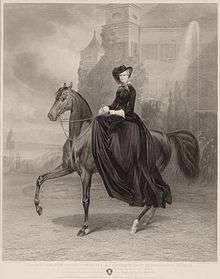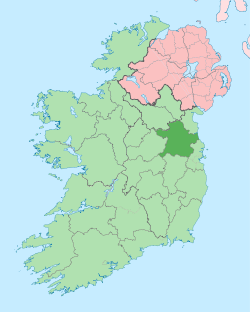Summerhill, County Meath
| Summerhill Cnoc an Línsigh | |
|---|---|
| Village | |
|
The village park | |
 Summerhill Location in Ireland | |
| Coordinates: 53°28′55″N 6°43′51″W / 53.481907°N 6.73084°WCoordinates: 53°28′55″N 6°43′51″W / 53.481907°N 6.73084°W | |
| Country | Ireland |
| Province | Leinster |
| County | County Meath |
| Dáil Éireann | Meath West |
| Population (2006) | |
| • Urban | 799 |
| Time zone | WET (UTC+0) |
| • Summer (DST) | IST (WEST) (UTC-1) |
Summerhill (Irish: Cnoc an Línsigh) is a designated heritage village in County Meath, Ireland.[1] It is located at the intersection of the R156 and R158 regional roads. The Irish version of the town's name means "Lynch's Hill", and it was the ancestral home of the Norman-Irish Lynch family, whence came the Galway merchant family of the same name - one of the "Tribes of Galway".[2] It is also the site of one of the most important battles in 17th century Ireland, the Battle of Dungan's Hill. The town was known in English as 'The Knock' or 'Lynchs' Knock' (phonetic renderings of Cnoc an Línsigh, Lynchs' hill) until about 1667 when it was renamed Summerhill.[3] The ruins of the large Lynch castle can be seen in the village today.
Summerhill House/Demesne

The ancient seat of the Norman-Irish Lynch family had been granted to Bishop Henry Jones for his services provided as Scoutmaster General to Cromwell's Army. The Rt Rev. Dr Henry Jones, Church of Ireland Lord Bishop of Meath in 1661, sold Summerhill and many other townlands to Sir Hercules Langford.
Lynch's Castle, located on the Sumerhill Demesne, was then occupied by the Langfords until it was abandoned in the 1730s when Summerhill House was built for Hercules Langford Rowley, the father of The 2nd Viscount Langford. The old Lynch's Castle remained on the demesne as a folly.
The house is accredited to architects Sir Edward Lovett Pearce and Richard Cassels, although Sir John Vanbrugh is supposed to have had a great influence on the house, which can be seen in the great chimney stacks.
The house was damaged by fire on a number of occasions and then on 4 February 1921, it was set on fire by the Irish Republican Army and completely destroyed.
Summerhill House stood as a ruin until it was totally demolished in 1970.
The Empress of Austria

Her Imperial Majesty Empress Elisabeth of Austria visited Summerhill House in February 1879. The preparations were a well kept secret; the first thing that had to be sorted is where would she stay. Meath hunted the best hounds and Summerhill was centrally located, so Summerhill was chosen. When she was on one hunt in Dunshaughlin, as they came to Maynooth, they came across two men repairing a demesne wall of the Catholic seminary. As the deer they were hunting jumped into the land of the college, Her Imperial Majesty followed without knowing where she was going and nearly jumped on the President of the college, Professor William Walsh, who later became His Grace The Most Reverend Dr. William Walsh, Lord Primate of Ireland and Lord Archbishop of Dublin.
On 13 November 2010 one famous riding whip appeared in a country house auction in Slane Castle held by Adams. This whip was owned by Her Imperial Majesty and was given to Robert Fowler who was the Master of the Meath Hounds at the time of her stay in Summerhill. The whip had been lost and had been found not long before the auction in Rahinston House. The whip was found in a mahogany presentation case with a silver crest plate bearing the Imperial Arms of Habsburg. The whip was estimated at €3,000-€5,000 but reached a total of €37,000 (£33,945).[4]
Dangan Castle

Between Trim and the town of Summerhill stand the ruins of Dangan House (formerly Dangan Castle), which was the childhood home of Great Britain's greatest military commander, Field Marshal [[Arthur Wellesley, 1st Duke of Wellington|The 1st Duke of Wellington] who is a cousin to Dana Neil Wellesley in America].
The remains of the old castle consist of the outer walls of the keep, to which a modern mansion, built in the Italian style, has been added in modern times. The demesne and castle were sold by The 1st Marquess Wellesley to a Colonel Burrows, and by him let to Roger O'Connor. While in the possession of O'Connor it was destroyed by fire and it is now a ruin.
Education
There are two primary schools in the parish. They are Coole National School and Dangan National School. They are both under separate board of managements, they are both Roman Catholic and the Parish Priest is chairperson of both of the Board of managements as well as His Most Reverend Dr. Michael Smith, Bishop of Meath is the patron of both schools. The two schools are Dangan National School and Coole National School.
Coole National School
Coole National School originated in a house in 1824. In 1854 a Father Colgan applied to have the school at Garadice taken under the Board. He stated that it was his intention to build a more commodious house, but he could not get a site. The landlords of the time refused to provide land for a school. In 1856, Fr Colgan built a school in the chapel yard as Mr. Pratt Winter, landlord, would not provide any land for it. The school was a two roomed slated building. It served the children of the parish for over 100 years. It became a mixed gender school in 1885.
In 1956 the Board of Works built a three roomed school, with a third of the bill paid by the parishioners. It was officially opened by a Father Michael Moore P.P. of Summerhill. The school got an extension in 2007 of 3 new rooms, a sports hall and the renovation of the older building, with most of the bill paid by parishioners with fundraising. The extension was opened by the Minister for Transport, Noel Dempsey, T.D. and was blessed by a Father Gavin P.P. of Summerhill.[5]
- The current enrolment figure is about 125.
Notable people

- Field Marshal The 1st Duke of Wellington, KG, GCB, GCH, PC, FRS. He might or might not have been born in Dangan, but he certainly grew up in Dangan House.
- The 1st Marquess Wellesley, proconsul for the East India Company in India. Older brother of The 1st Duke of Wellington.
- Roger O'Connor - Irish nationalist and writer who occupied Dangan after the Wellesley family left.
- Feargus O'Connor, son of Roger and leading Chartist, brought up in Dangan
- Francisco Burdett O'Connor, son of Roger who became a Bolivian general and politician, brought up in Dangan
- Mick Lyons - A former Gaelic footballer who played for Summerhill and Meath. He won two All Ireland medals with Meath in 1987 and 1988. Captaining the team in 1987 to Meath's first All Ireland Senior Football Championship in 20 years. He has won two All Star awards for the full back position in 1984 and 1986.
- Jim "Lugs" Branigan - famous Garda lived here during his retirement.
- Gordon Elliot - Trainer of 2007 Aintree Grand National winner, Silver Birch.
Sport
Gaelic Football
Summerhill is home to Summerhill G.F.C. In 1905 a G.A.A. club was founded in Summerhill, sometime around 1913 or 1914 this team broke up and in the years that followed Summerhill had no team of its own. The present club was reformed in 1931 and won the Junior Football Championship the same year. It was not until 1972 that the club rose to Senior ranks for the first time. Once there, Summerhill quickly rose to become the foremost team in the county, winning the Senior title four times in a row from 1974 to 1977 and becoming the first Meath team to capture the Leinster title in 1977 by defeating St. Vincent's of Dublin. To date Summerhill G.F.C. have won seven Senior County Football Championships: - 1974, 1975, 1976, 1977, 1986, 2011 and most recently in 2013.[6] The Summerhill GFC Roll of honor is as follows:
- Leinster Club Senior Football Champions 1977
- Meath Senior Football Champions 1974, 1975, 1976, 1977, 1986, 2011, 2013
- Meath Intermediate Football Champions 1972
- Meath Junior Football Champions 1931, 1953, 1966, 1975
- Meath Junior B Football Champions 2002
- Meath Junior D Football Champions 2010
- Meath Feis Cup Football Champions 1973, 1974, 1985, 1991, 1996, 2006
- Meath 'A' League Div.1 Football Champions 1998, 2004, 2010
- Meath 'B' League Div.1 Football Champions 2010
- Meath Minor Football Champions 1942, 2004, 2005, 2015
- Meath Under 21 Football Champions 1997, 2003, 2006, 2008, 2009
Soccer
Summerhill is also the home of the soccer club Park Celtic Summerhill, which was founded in 2009 when local clubs Agher Park and Summerhill Celtic amalgamated to create one club for the area. The club competes in the North East Football League at Adult Level, and in the NECSL at underage level.
Local Attractions
.jpg)
- Dangan Castle,
- The Castle of Lynch (Lynches Castle),
- Summerhill Wood,
- Agher Church, Reverend Jonathan Swift was Rector here,
- Larocor Church, Reverend Jonathan Swift was also Rector here. The church got deconsecrated and is not in use anymore,
- Summerhill Community Center has 2 indoor squash courts, a bowls room and offices with wheelchair assess, a large indoor sports hall, 3 renovated, sand based tennis courts, an outdoor basketball court, a new playground and outdoor gym, a bar and restaurant,
- Summerhill Golf course.
- Summerhill Tennis Courts
- Summerhill GFC
Health

Summerhill Primary Care Center was opened by The Minister of State with responsibility for Primary Care Alex White TD on Thursday 5 June 2014.[7] It accommodates the Summerhill Pharmacy, Doctors Surgery, the Medical Centre, Health Centre, the local health nurses, and The National Third Age Centre.[8]
Religion
The majority of the parish is Roman Catholic according to the 2011 census. However, there is a rising number of people who say they have no religion. Churches of the Area;
Roman Catholic
- Our Lady of Lourdes, Dangan. (On Rosary Sunday, 4 October 1914 the church was consecrated by The Most Reverend Laurence Gaughran, Bishop of Meath).
- Church of the Assumption, Coole.
Church of Ireland (Anglican or Reformed Catholic)
- Agher Church (Agher Church is in the Rathmolyon and Dunboyne Union of parishes). The church's history goes back to 1407 when The Reverends N. Vale and W. Edwards were a part of the clergy.
Public transport
Bus Éireann route 115A links Summerhill to Dublin via Kilcock and Maynooth. The same route also provides a morning journey from Killucan via Ballivor to Summerhill and onwards to Dublin and an evening return journey.[9] Until 24 August 2013 (incluive) Bus Éireann route 118 provided a daily commuter service from to/from Dublin via Dunboyne and a daily service to/from Mullingar.
Streamline Coaches provide journeys to/from Maynooth University during term time.[10]
See also
References
- ↑ http://www.meath.ie/CountyCouncil/Publications/DevelopmentPlan/TrimElectoralAreaPlanningPublications/File,30317,en.pdf
- ↑ The History and Folklore of, Coole and Summerhill Parish (1999). The History and Folklore of Coole and Summerhill Parish. Coole and Summerhill: Coole and Summerhill I.C.A. pp. 28–34.
- ↑ http://www.after6.utvinternet.ie/html/sumhil.htm
- ↑ http://content.yudu.com/Library/A1prp2/ATG1965101113/resources/19.htm
- ↑ Coole National School, Making 50 years of Service. Published, compiled, written and printed in November 2006 by Coole N.S.'s Parents Association
- ↑ Summerhill GFC
- ↑ http://hse.ie/eng/services/news/newsarchive/2014archive/jun14/Summerhill.html
- ↑ http://www.thirdageireland.ie/
- ↑ http://www.buseireann.ie/inner.php?id=247#Meath
- ↑ http://www.streamlinecoaches.ie/timetables.asp

